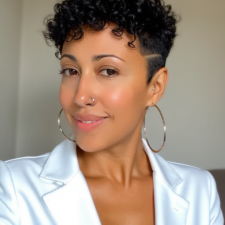The Early Days: Learning in Isolation



By Melinda Medina
When I first stepped into a classroom over a decade ago as a special education teacher in New York, I had a heart full of fire and a head buzzing with theory. What I didn’t have—at least not yet—was mentorship. Real mentorship. The kind that meets you where you are, helps you untangle the knots of self-doubt, and reminds you that your voice belongs in the room.
Back then, feedback came in the form of a quick post-observation debrief or a rubric score with vague bullet points. No one really explained how to grow. No one talked me through how to co-plan with another teacher who didn’t believe in inclusive curriculum and equity. No one told me what to do when a student with trauma shut down mid-lesson, and I felt completely unprepared to reach them.
I learned by stumbling. I learned by watching. I learned in isolation.
But it shouldn't be that way.
Over time, I began to notice the difference between survival and sustainable growth. The difference? Mentorship and peer-feedback cycles. Not the checkbox version that pairs you with someone for a semester and ends with a signature—but the kind rooted in trust, vulnerability, and consistent feedback. The kind that says, “I see you,” when you’re questioning everything, and also pushes you with, “Let’s talk about what you could try differently,” without making you feel small. Meaningful cycles of feedback with actual purpose feeding into one cohesive vision of unifying a school community.
Adult Growth is Not One-Size-Fits-All
As I’ve grown into leadership roles over the last few years—mentoring new teachers, leading PDs, serving on hiring committees—I’ve made it a priority to disrupt that cycle of isolation. Feedback should be generative, not punitive. And mentorship should be a two-way street—where everyone learns, everyone grows, and no one is disposable.
As someone in the Self-Authoring stage of Kegan’s Constructive-Developmental Theory, I have come to understand that adult growth isn't linear—it’s deeply tied to how we make meaning of our experiences.
In this stage, I construct my own identity, values, and belief systems. But equally important is recognizing that not everyone I work with is in this stage. Some colleagues are in the Socialized Mind stage, looking to external validation or norms for guidance. Others may be transitioning between stages. Understanding this has been critical in shaping how I mentor, engage with colleagues, and how I give feedback. Feedback and discourse only works when it speaks to where the person is, not just where we think they should be.
A Case for Compassionate Coaching

Let me tell you about a teacher I mentored last year—Ms. Rivera, a brilliant first-year educator who came in with strong curriculum knowledge but struggled with classroom management. In our first feedback meeting, she said, “I just feel like I’m failing, but I don’t know what else to try.” We looked at a recording of one of her lessons together. We didn’t talk about what was "wrong." We talked about what we noticed. We talked about patterns. We planned together.
Over the next few weeks, she tried new strategies. I observed, gave her bite-sized feedback, assisted in her classroom during instruction, modeled, and celebrated the small wins like students transitioning more smoothly, clearer expectations, and stronger relationships. By June, she wasn’t just surviving—she was thriving. And more importantly, she felt like she belonged.
That’s the power of mentorship. Not saviorism. Not perfection. But partnership.
How We Rebuilt Our Feedback Ecosystem
At our school sites, we often felt disconnected and disjointed—like we were functioning as silos rather than a unified school community. This disconnection wasn’t about lack of passion or talent. It was a structural issue. And it became clear to me that we needed to create deliberate systems of collaboration, observation, and feedback to bring us back together.
Here’s what we did to change that:
- Scheduled classroom inter-visitations and intra-visitations across all sites provided staff the opportunity to observe, learn, co-teach, and implement with their counterparts. This included teachers, paraprofessionals, administrators, school-aides, site unit coordinators, and related service providers.
- Building in collaborative planning time so feedback isn’t isolated to one teacher, one classroom, or one moment. The goal? Increase student engagement through differentiated instruction.
- Staff engaged in judgment-free collaboration to develop cohesive academic standards and expectations across all sites. It was about alignment—not uniformity. And it required vulnerability and trust, which we built through consistent, reflective dialogue.
- We also created structures where staff could collaborate to create opportunities for students across all sites to integrate—whether through community-building events, shared SEL activities, or cross-site projects. This was especially powerful in helping our students develop meaningful social-emotional skills across contexts.
- Administrators committed to offering differentiated professional development opportunities for all staff members. From trauma-informed practices to culturally responsive teaching, PD was no longer one-size-fits-all.
- Replacing the “gotcha” observation culture with coaching cycles rooted in reflection and instructional goals set by the teacher, not just for them.
- Finally, we implemented end-of-year staff meetings to assess our progress in the domains of peer collaboration, inter-site and intra-site learning, and feedback culture. This allowed us to reflect honestly, course-correct, and celebrate growth.
Disrupting the Default
I’ll be honest—this isn’t always easy. The system wasn’t built for mentorship or authentic feedback cycles. The pace of our days, the constant urgency, the emotional labor—they all work against the slow, intentional work of feedback and growth. But I also know what happens when we don’t make space for it. We lose teachers. We burn them out. Or worse, we let educators stagnate in isolation, thinking their struggles are theirs alone to carry.
For educators navigating racism, ableism, classism, and burnout, structured mentorship and feedback cycles are more than just “nice to have”—they are resistance. They are how we survive and thrive in a system that often wasn’t built with us in mind.
Feedback and Mentorship Are Human Work

There’s also a cultural shift that needs to happen when we talk about feedback. Too often, feedback is something we brace for. Something that feels evaluative instead of developmental. That’s especially true in schools where teachers of color or early-career educators are often under extra scrutiny. We must shift feedback from being a performance review to being a safe and creative reflection space. And we need to offer feedback that is actionable, affirming, and aligned with the educator’s goals—not just the school's metrics.
It also means valuing feedback that isn't just about instruction. I've had teachers share that what helped them most was not a lesson tip, but someone noticing that they hadn’t eaten lunch. Or asking if they wanted to co-write an email to a challenging parent. Or offering to watch their class so they could breathe.
Mentorship, at its core, is human. And human work is messy, nonlinear, and deeply relational.
I think about my own mentors—some formal, most informal. The para who reminded me that breaks are sacred. The assistant principal told me, "Don’t shrink to fit this space. Expand the space." The colleague who brought me tea and perspective when I was questioning my impact. These moments mattered. They tethered me to this work.
Connection as a Condition for Growth
While we love the myth of the lone genius — the one who pulls themselves up by the bootstraps, works in silence, and comes out on top. We must realize that in today’s workplace, going it alone is a fast track to burnout, miscommunication, missed opportunities, and missed connections. As someone who prided myself on being self-sufficient, I initially thought asking for help meant I was weak or unprepared. But over time, I saw that the most effective and emotionally intelligent leaders were those who invited others in — to co-plan, to troubleshoot, to dream bigger. We must learn to set internal reminders that knowing when to lead and when to listen will help continue to push our personal and professional growth.
In a profession that demands so much—emotionally, mentally, spiritually—we must invest in structures that nourish our educators. Mentorship and feedback cycles are not fluff. They are infrastructure. And when we get them right, we create the kind of school ecosystems where everyone—students and adults alike—can flourish. Your ecosystem should consist of people who challenge you, support you, and see your blind spots — not to shame you, but to help you grow. So, the next time you feel the urge to not hear someone’s feedback, tough it out alone, or not engage in mentorship, pause and ask: What might be possible if I invited someone in?
Because real success — the kind that’s sustainable and fulfilling — isn’t a solo act. It’s a symphony that harmonizes through connection.
This article was crafted by Melinda Medina, an independent contributor engaged by CheckIT Labs, Inc. to provide insights on this topic.

Melinda is an aspiring leader, consultant, special educator, published author, and advocate for equitable education. She holds a Master of Science in Teaching and a Master of Science in Educational Leadership, and has dedicated her career to supporting neurodiverse students and breaking generational cycles through education.



